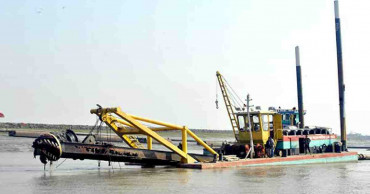River dredging
BIWTA dredging restores navigability of Sunamganj rivers; boosts trade, employment
Conservation dredging by the Bangladesh Inland Water Transport Authority (BIWTA) has significantly improved navigability of key waterways in Tahirpur upazila, reviving trade, easing transportation and creating fresh employment opportunities in the region.
As dredging has restored water flow in the Patlai, Baulai and Rakti rivers, cargo vessels carrying coal and stones are once again operating smoothly, particularly along the Takerghat–Mokshedpur route.
The development has brought long-awaited relief to traders, workers and local residents dependent on river-based trade.
For years, the three rivers would almost dry up during the dry season, crippling operations at the Barachhara, Charagaon and Bagli customs stations.
Read more: Shipping Ministry forms committee over alleged BIWTA bribery
Importers of coal and stone suffered heavy losses as goods transport stalled and thousands of workers were left without regular employment.
To address the crisis, BIWTA has been carrying out conservation dredging over the past two to three years using cutter suction dredgers. As a result, navigability has improved markedly in the current fiscal year, allowing vessels to transport larger volumes of goods without disruption.
In Takerghat area, the Patlai River, which once dried up completely during the dry season—forcing people and livestock to cross on foot—now supports the movement of both small and large vessels.
Md Khasrul Alam, president of the Barachhara Coal Importers Group and former chairman of Sreepur Uttar Union Parishad, said the dredging had doubled business activities over the last two years.
“If capital dredging is undertaken in the future, trade will increase manifold,” he said.
Read more: Dawn upon Rangamati: Govt steps in to protect rivers and people
BIWTA officials said dredged soil is being distributed free of cost for public welfare projects with due approval. The soil has been used to fill low-lying areas of government schools, colleges, mosques, madrasas, graveyards and rural roads across several unions, contributing to local development.
1 month ago
Better flood management: China offers assistance for dredging rivers in Bangladesh
Chinese Ambassador to Bangladesh Yao Wen has offered assistance for dredging relevant rivers in Bangladesh — to improve their capacity for better management of flood situations.
Ambassador Yao met Foreign Minister Dr AK Abdul Momen at the Ministry of Foreign Affairs on Wednesday (July 05, 2023) and discussed issues of mutual interest.
While exchanging views on climate change, the issue of the prevailing monsoon and its impact on possible flood situation in the country, particularly the occurrence of flash-floods, came up, according to a press release from the Ministry of Foreign Affairs.
Also read: China welcomes Bangladesh to BRICS as the grouping seeks expansion: Spokesperson
Foreign Minister Momen reviewed the efforts for facilitating the desired repatriation of the Rohingyas, temporarily sheltered in Bangladesh on humanitarian grounds, to their homeland in Myanmar’s Rakhine State.
They also reviewed the ongoing bilateral cooperation in various multilateral and international forums.
During the meeting, Foreign Minister Momen reiterated Bangladesh’s commitments for further enhancing the ‘South-South Cooperation’ for greater collective benefit of the global South.
He referred to innovative approaches including that of the Community Clinics introduced in Bangladesh by the government of Prime Minister Sheikh Hasina, which is now internationally appreciated.
Also read: China says PM Hasina's remarks against sanctions reflect a ‘large part of int'l community's mind’
Momen observed that a developing country like Bangladesh could apply a lot of practical, simple and viable Chinese innovations for the benefit of the people.
The Chinese envoy spoke about the different development projects in Bangladesh that are being carried out with support from China.
Foreign Minister Momen thanked China as a development partner.
He encouraged greater Chinese investment in Bangladesh to facilitate more job creation and transfer of technology and skills.
Also read: Chinese enterprises in Bangladesh will further promote sustainable development, deepening ties: Ambassador Yao
Momen also stressed on initiatives for reducing the huge trade imbalance between the two countries.
As the ambassador extended invitations to the foreign minister to various events in China, the latter thanked him and took note of it.
2 years ago
Experts seek master plan for sustainable river dredging
Experts at a webinar on Saturday urged the government to prepare a master plan for ensuring sustainable river and canal dredging and their management in a bid to accelerate further economic advancement of the riverine country.
They also said the number of rivers in Bangladesh is declining due to siltation and fall in streamflow affecting waterways that are the cheapest means of transportation.
Under the circumstances, the experts called upon the government to make an adequate allocation for river dreading and proper river training.
Also read: Capital dredging project: First phase set to miss deadline
Dhaka Chamber of Commerce & Industry (DCCI) arranged the webinar titled ‘Sustainable River Dredging: Challenges and Way Forward'.
Water expert and Brac University Professor Emeritus Ainun Nishat presented the keynote paper at the programme while State Minister for Shipping Khalid Mahmud Chowdhury joined it as the chief guest.
Dr Nishat said there are two types of dredging like maintenance dredging and capital dredging. “A master plan should be prepared for river and canal dredging in Bangladesh.”
He said dredging should be done in a sustainable manner so that the economy can be benefited as rivers not only carry water but also carry lives. “For an efficient river management, special emphasis must be put on maintenance dredging.”
Stating that the private sector can play a major role in dredging operation, the water expert said also underscored the importance of investments in dredging and de-siltation works. “Private dredging operators must be trained on sustainability issues. PPP can be a useful model for river dredging, sand extraction, land recovery, land accretion and land reclamation.”
Also read: Kaladumur River dying; immediate dredging needed
Dr Nishat said the current practice of dredging operations, both capital and maintenance, need to be evaluated urgently. “Rules and guidelines for sand dredging from river beds should be updated and followed strictly.”
He suggested establishing a river training institute to create skilled manpower for river management.
Institute of Water Modelling (IWM) Executive Director Abu Saleh Khan said the total river basin system should be analysed in an efficient manner. “Dredgers are now ultramodern and highly efficient but they need proper training for skill development and capacity building.”
He also focused on sustainable dredging and long-term strategic planning in the maritime sector. “For sustainable dredging, dredgers have to have the idea on soil condition, river system, stream nature and ecological system. There should have been a post-dredging evaluation system in the policy.”
State Minister for Shipping Khalid Mahmud Chowdhury said the government has been working sincerely to ensure effective river management as per its delta plan. “We’ve a plan to make 10,000 km inland river ways navigable.”
He said the capacity of Mongla Port has now increased manifolds, easing the pressure on Chittagong port. “We’ve limitations and challenges but we must have to manage our rivers through efficient dredging as these’re our natural assets.”
The junior minister said the government has been working on sustainable river dredging both in the form of capital dredging and maintenance dredging and 35 more dredgers will be procured soon.”
As per the delta plan, he said, the government is firmly committed to developing the riverine system in the country. “We invited the private sector to come forward with more investments, even in the PPP format, to materialize the delta plan.”
DCCI President Rizwan Rahman said waterways play a diverse role in the economy of Bangladesh as it is a riverine country.
“It’s a high time to improve the waterways for the sake of both industrial and socioeconomic development of the country as Bangladesh is poised to become a developing country by 2026. The 24,000 km of waterways come down to 6,000 km in monsoon and 3,600 km during the lean period due to dynamic characteristics of the rivers and its effect falls into the economic and ecological state of the country,” he observed.
He said navigable waterways have manifold positive cascading effects on the economy as it saves container movement time and ensures comparatively cheaper goods transportation system. “Navigable and well-managed waterways help ease cross-border trade growth with the neighbouring states. But lack of maintenance, weakening upstream flow and human interventions are some of the common problems for declining navigable waterways.”
4 years ago





